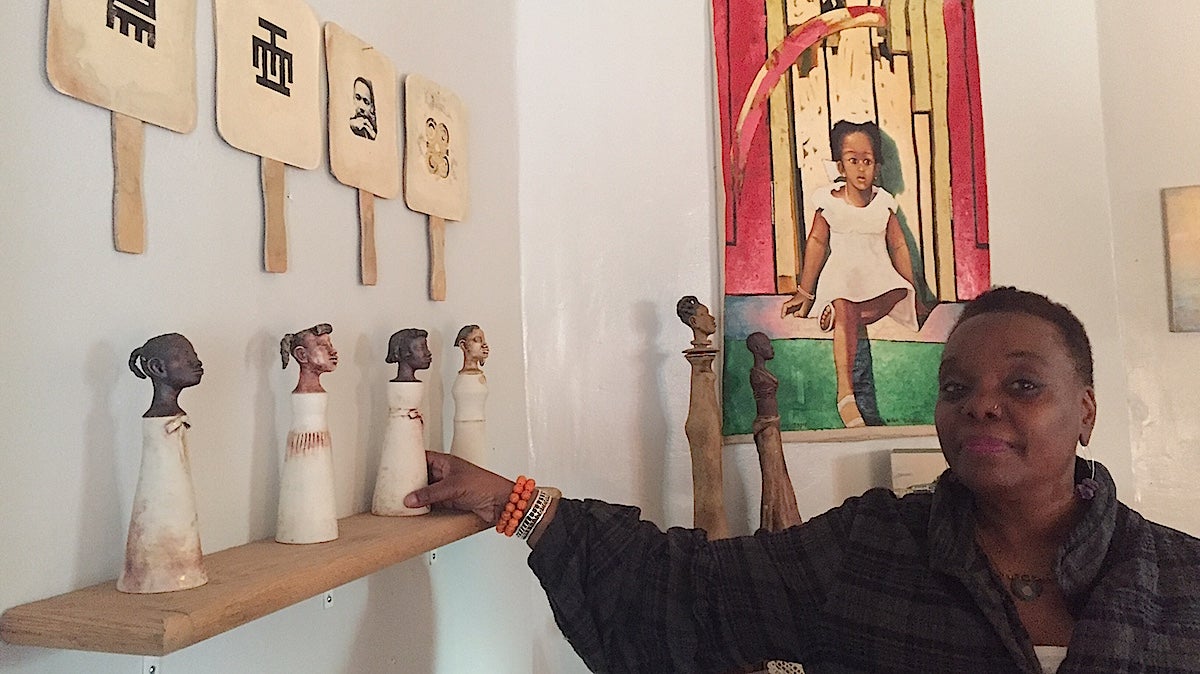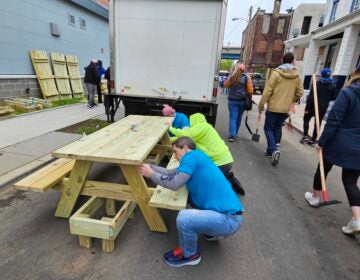Germantown’s Colored Girls Museum celebrates everyday black women
Listen
Vashti DuBois in The Colored Girls Museum. (Neema Roshania Patel/WHYY)
On a seemingly ordinary residential street in Philadelphia’s Germantown neighborhood, Vashti DuBois is busy putting the final touches on The Colored Girls Museum’s latest exhibit.
In her house.
She’s marking Women’s History Month by turning her house into a museum that honors everyday black women.
Walk into the museum, and you’ll see signs of ordinary life everywhere. The kitchen doubles as an exhibit on ceramics and beading; the dining room features an exhibit showcasing quilts and dolls. Cartoons are blasting from the TV, keeping DuBois’ grandson amused while her daughter works on the museum’s website.
“It’s a family affair,” she said.
“We know there are museums that celebrate famous people, there are museums that celebrate medicine, there are museums for all sorts of things,” DuBois said. “We think there should be a colored girls museum. A museum that really looks at the world through the lens of the ordinary extraordinary colored girl.”
And that it’s in her house? It’s part practical — her three-story home in a historic neighborhood has plenty of space — but also falls in line with the message of the museum.
“This is my house, so it’s really and truly a living museum. There was a time when we didn’t inhabit these spaces the way we inhabit them now, and what I mean by ‘we’ is black folks, colored folks. So in installing work like this, there is a conversation that comes out of the walls that people really haven’t heard.”
Artist Denyse Davis said the setting allows the museum to take on a unique feel.
“When you’re in a physical museum-type building, you’re kind of stiff and quiet, but this is a place that makes you feel like home,” she said.
A tribute to the washerwoman
All three floors of the house are open to visitors. Up on the second floor is the exhibit Davis worked on. It’s a tribute to the washerwoman, “an unsung hero” of recent black history, said Davis.
A look at the washerwoman exhibit at The Colored Girls Museum. (Neema Roshania Patel/WHYY)
Davis and her creative partner put together the exhibit to draw attention to the often overlooked role of washerwomen, a common line of work in the generation of their grandmothers that helped provide for their families.
“It paid the bills, and you know, thank goodness, because what would people do if they didn’t have a means to make money,” said Davis. “People need to see that this really existed.”
The making of a museum
DuBois toyed with the idea of starting up The Colored Girls Museum for a long time. It was a project she finally took up following the death of her husband.
“One of the things I noticed when I started coming back to life, if you will, was notice how many things that I had been responsible for weren’t done. And it really made me present to how much colored girls do in community,” she said.
In the midst of the high-profile deaths of Michael Brown, Eric Garner, Freddie Gray and other black men fatally injured by police or while in custody, she couldn’t stop thinking about how the women in their lives were being affected, and how that was likely causing a ripple effect in their communities.
“I just want to find a way to say there is love for you while you suffer, while you grieve, while you mourn, there is a recognition of the work you do and how hard it is to do it and how long you’ve been doing it,” she said.
So the Colored Girls Museum was born, first as part of the Philadelphia Fringe Festival, and now in celebration of Women’s History Month. DuBois hopes to turn the museum into traveling exhibits, but for now she’s happy to welcome those interested into her home.
“I feel honored,” she said. “So many of our generational stories are being held by the objects and artwork in every single room in this museum.”
WHYY is your source for fact-based, in-depth journalism and information. As a nonprofit organization, we rely on financial support from readers like you. Please give today.




